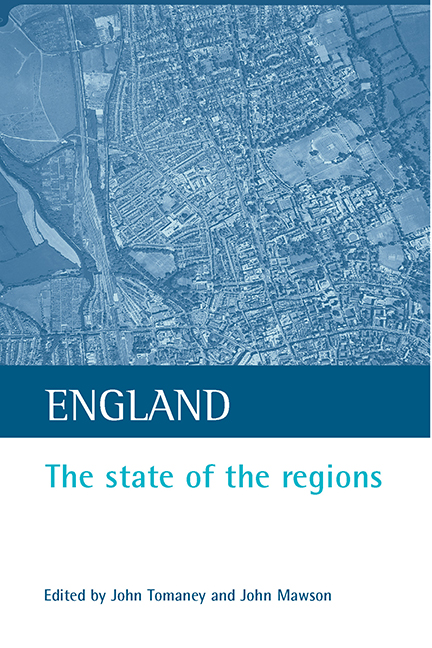Book contents
- Frontmatter
- Contents
- List of tables and figures
- Acknowledgements
- List of contributors
- one Introduction
- two Regional government in England: reviewing the evidence base
- three New Labour and the evolution of regionalism in England
- four Yorkshire (and the Humber)
- five Institutional collaboration in the West Midlands region
- six England's North West
- seven The South West
- eight Regionalism in the East of England
- nine The South East region?
- ten Regionalism in North East England
- eleven Regional strategy development in the East Midlands
- twelve The problem of regional governance
- thirteen Elected regional government: the issues
- fourteen Barnett plus needs: the regional spending challenge in Britain
- fifteen Conclusion: prospects for regionalism
- Index
- Also available from The Policy Press
seven - The South West
Published online by Cambridge University Press: 20 January 2022
- Frontmatter
- Contents
- List of tables and figures
- Acknowledgements
- List of contributors
- one Introduction
- two Regional government in England: reviewing the evidence base
- three New Labour and the evolution of regionalism in England
- four Yorkshire (and the Humber)
- five Institutional collaboration in the West Midlands region
- six England's North West
- seven The South West
- eight Regionalism in the East of England
- nine The South East region?
- ten Regionalism in North East England
- eleven Regional strategy development in the East Midlands
- twelve The problem of regional governance
- thirteen Elected regional government: the issues
- fourteen Barnett plus needs: the regional spending challenge in Britain
- fifteen Conclusion: prospects for regionalism
- Index
- Also available from The Policy Press
Summary
Introduction
The South West is one of the largest and most diverse English regions. Until recently there was neither a strong track record nor well-established networks of partnership and interagency working at the regional level. The regionalisation experience in the South West is instructive, with some important issues and lessons for the wider processes and timescales for regionalisation across the different English regions.
This chapter sets out a brief profile of the region and the main regional strategies. It then considers the ‘institutional inheritance’ for the Regional Development Agency (RDA) and the regional institutions, and the process and partnership working issues in relation to the development of the Regional Strategy and Action Plans. The following section outlines the main features of the progress so far in the development of the regional institutions, regional stakeholder fora, and subregional partnerships. Some next steps for the regional bodies are then discussed, followed by the setting out of some conclusions and issues for the wider process of regionalisation in other regions.
The regional context
The nature of the region and the main social and economic challenges
The South West covers the largest geographical area of all the English regions, stretching from Lands End in the far south west to Gloucestershire in the north, and Swindon, Wiltshire and Dorset in the east. From the northern edge of Gloucestershire, it is as far to the Scottish border as it is to the western tip of Cornwall. While some parts of the region such as Bristol and the M4 corridor have good access to the rest of the country, peripherality and lack of accessibility are important issues for many other areas. In economic terms, the region has in recent years underperformed in comparison to the rest of the UK. GDP per capita is below the UK and European Union averages, although unemployment has fallen relative to the UK average (and in absolute terms). It is a highly diverse region in terms of economic structure, with significant differences between the nature of problems and opportunities of different subregional areas. The M4 corridor and Bristol and its northern fringes have been relatively successful in attracting hi-tech businesses, and investment and employment in corporate ‘head office’ functions, and business and financial services.
- Type
- Chapter
- Information
- EnglandThe State of the Regions, pp. 95 - 108Publisher: Bristol University PressPrint publication year: 2002



